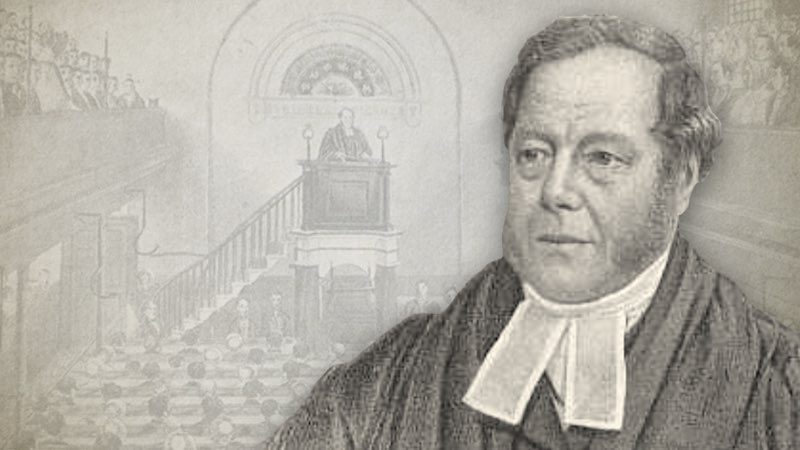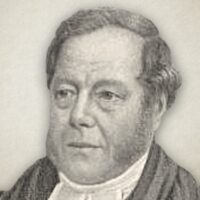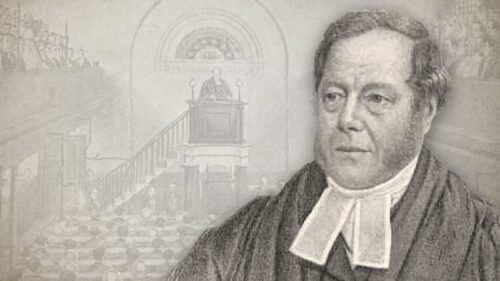
Letter 5: To Zebah—On Atonement
My dear Zebah,
The subject on which I am about to offer you a few remarks, has been dear to the heart of every Christian in all ages; it is the glory of the gospel scheme, and shall constitute our song in the realms of bliss; it is therefore desirable, that your mind should be well informed upon it, and deeply affected with it.
Throughout the mosaic economy, the doctrine of atonement was set forth in lively colours by the bleeding victims on the Jewish altar. Prophets spake of it in the most unequivocal terms, and apostles asserted it as the fundamental article of Christianity; yea, the exclamation of John, “behold the Lamb of God, which taketh away the sin of the world,” was but the echo of what patriarchs, priests, and prophets had proclaimed ages before.
A very distant view of the perfections of Deity, connected with a little acquaintance with human depravity will constrain the man whose eyes are not blinded by the god of this world, to receive the sentiment of the apostle “that without shedding of blood, there is no remission,” and this solemn truth admitted, will render the atonement of Christ an essential doctrine.
But I trust, I need not attempt to prove my dear Zebah, a doctrine which is written as with a beam throughout the inspired page, and which no real disciple of Christ disputes or denies. I would rather attempt to unfold its preciousness to your mind, and stir you up to examine whether you have received the atonement; for this, like every other part of the covenant economy, is a personal concern.
I shall begin with the divine appointment of the great sacrifice for sins, which displays at one view a grand constellation of divine glories, visible only to a spiritual discernment. Here faith beholds condescension making its lowest stoop— compassion moving with unparalleled tenderness— justice maintaining its highest claims— mercy opening its boundless stores— truth preserving its immaculate purity— and love distributing its illimitable ocean in rivers of salvation.
The victim which infinite wisdom appointed, was no other than the co-equal Son of God, and because Deity could not suffer, a body was prepared for him, that perfect humanity might bleed in sacrifice, and that the sacrifice might be acceptable and meritorious by virtue of its union with Deity. An angel, nay, all the angels in heaven, would not have been a sufficient sacrifice for man: the guilt is infinite and the atonement must be infinite too; therefore none but an infinite being could become the victim. “Herein is love’” unparalleled love, “not that we loved God, but that he loved us, and sent; his Son to be the propitiation for our sins.”
Follow this divine victim, my dear young friend, into the scene of his sufferings, “when it pleased the Lord to bruise him, and put him to grief, that he might make his soul an offering for sin.” Led as a Lamb to the slaughter from the agony of Gethsemane, to the insults of the Roman tribunal, and to the ignominy of Calvary, when heaven, earth and hell assembled to smite the anointed victim, whose blood should atone for guilty man. How did the powers of darkness rage when the serpent’s head was braised? How did the inhuman fury of the carnal mind mock the sufferings of the Prince of Peace? And how did his Father’s frown pierce his soul, while Justice struck the tremendous blow? In all this, my dear brother, he was bearing “our sins in his own body on the tree.”
Had be not been Omnipotent, he must have sunk beneath the load to rise no more; but, lo! he triumphs on the cross, and amidst all his sufferings he spoils principalities and powers, making a shew of them openly on his cross, exclaiming “it is finished,” and proving himself “mighty to save.” Thus he finished transgression, made an end of sin, and made reconciliation for iniquity to bring in an everlasting righteousness, yea, “by his one offering he hath perfected for ever them that are sanctified ”The Father is well pleased for his righteousness sake— he hath magnified the divine law— satisfied justice — cancelled his people’s debt— blotted out the handwriting that was against them; and is gone to prepare mansions of bliss for them, having determined that where he is they shall be also.
Now there is a two-fold way in which this atonement is received: viz. as a matter of faith: and in its special influence. As a matter of faith, it is apprehended and trusted, as the channel through which divine pardon flows, and the only way of access to God, for “we have redemption through his blood, the forgiveness of sin.” Eph. 1:7. No sinner can approach a holy God with acceptance, but through the blood of atonement; and the apostle assures us, we have “ boldness to enter into the holiest, by the blood of Jesus.” Heb. 10:19.
Our Lord himself has shut the door of hope against all who reject his atonement, by saying, “no man cometh unto the Father, but by me.” It is therefore an act of the most daring presumption, to approach Jehovah without the blood of atonement.
The high priest under the law appeared before God officially, on the behalf of his people; but not without blood, and Jesus the great antitype of the jewish priesthood, was thereby clearly set forth, of whom the apostle says “by his own blood, he entered in once into the holy place, having obtained eternal redemption for us.” Heb. 9:12. Without an eye to the atonement of Christ, all the temple service, and the whole employment of the high priest appears inexplicable and absurd; but pointing to “the Lamb of God, which taketh away the sin of the world,” they are fraught with instruction, and exhibit a shadowy outline of the economy of grace, to assist the faith of old testament saints; while believers under the gospel dispensation, are encouraged by them to maintain their hold of the substance.
On this precious atonement, the awakened sinner under divine teaching, places all his dependence, convinced that there is no salvation in any other way, and believing that Jesus by his own blood has entered once into the holy place, having obtained eternal redemption for us. And having “put away sin by the sacrifice of himself,” he is able also to save them to the uttermost that come unto God by him.
The atonement of Christ is also received in its special influence, and hence the apostle informs us, it purges the conscience from dead works to serve the living God. That is, being applied to the conscience by die power of the Holy Ghost, it destroys the spirit of slavery by which dead works are performed, and removes the guilt which frightened the sinner into something like morality, so that he now serves God in newness of life, and consequently is lively in his service.
Whenever a sinner is awakened to his danger by the Spirit of the Lord, and feels himself under the curse of a broken law, it is impossible to afford him peace of mind by any thing else but the blood of atonement; nor is it enough that he hears of it— or believes it to be sufficiently efficacious, it must be applied to his conscience by the power of the Holy Ghost; then, it cleanses him from all sin, 1 John, 1:7— justifies him, Rom. 5:9. sanctifies him, Heb. 13:12.— and speaks peace to his troubled soul, Col. 1:20.
By this time my dear Zebah, is no doubt anxiously waiting to be directed into his own evidence of being interested in this atoning sacrifice, and I am as desirous to give you a little assistance on this all-important point. To look into the secret purposes of God and examine whose name is in the book of life, is not my prerogative; but some satisfaction may always be obtained, on this subject, by contemplating what the Lord has done in your soul.
It cannot be difficult for you to determine whether you have received the atonement by faith and felt its powerful influence in your heart— whether the burden of guilt has oppressed your soul and sent you to the foot-stool of divine mercy, pleading for pardon through the finished work of Christ and whether Jesus has become precious to you, as the sinner’s Friend.
With such evidences as these, you may safely conclude with Manoah’s wife, that if the Lord had intended to destroy you, he would not have shown you such things as these. Having felt your need of atoning blood, it shall (in the Lord’s time) be applied in all its peace-speaking influence and sin-killing power, proving your interest in the sacrifice of Christ and giving you sweet assurance of the Father’s everlasting love.
Yea I may go farther and affirm that your hatred to sin, as sin, is a proof that the blood of atonement has already been applied; for that only can destroy the love of sin, which is interwoven with our natures. Go on my brother, to seek its daily application, by the influence of the Holy Ghost, nor doubt but that it will cleanse you from all sin, and give you at last to sing with all the redeemed of the Lord around his throne, “thou hast redeemed us to God by thy blood.”
You are anticipating, my dear young friend, the sacred privilege of approaching the Lord’s table; and there I trust, you will be favoured with some delightful views of the atonement and sweet assurance of your interest in it: allow me to exhort you, while receiving the cup and drinking the wine, to reflect on the statement of the apostle by the inspiration of the Holy Ghost, “the cup of blessing which we bless, is it not the communion of the blood of Christ? There I trust you will see the infinite efficacy of the blood of atonement, and feel its power upon your soul, removing slavish fear and sealing divine pardon to your conscience; and as often as you approach that festive board, may you by faith eat the flesh, and drink the blood of the Son of God, until, in his immediate presence you join the everlasting song “unto him that loved us and washed us from our sins in his own blood, and hath made us kings and priests unto God, and his Father, to him be glory and dominion for ever and ever, Amen.
That the precious blood of atonement may be daily applied to your conscience by the power of the Holy Ghost, is the prayer of,
Yours, &c. In the Lord Jesus,
J.I.
You sacred victim, bleeding, on the brow
Of Calvary—the spotless Lamb of God—
Is God’s appointed sacrifice for sin.
He sheds his blood, and justice asks no more
The hand that smites him, lets the sheep go free.
He dies! that I may never die— he lives! —
He lives! and hence I shall for ever live.
To sing for ever his atoning blood,
Millions of souls, once guilty and defil’d.
Shall swell the chorus, “worthy is the Lamb,”
Once slain in sacrifice, to ransom us;
And while his matchless glories, all unveil’d.
Exceed what eye hath seen or ear hath heard,
They gaze upon his vesture dipt in blood,
And own their bliss was purchas’d by his death.
Joseph Irons (1785-1852) was an Independent sovereign grace preacher, author and hymn writer. In 1819, he was appointed the minister of Grove Chapel, Camberwell, a position he held until his death thirty-three years later. John Hazelton wrote of him:
“Joseph Irons (1785-1852) was one of the ablest preachers of his day, and a powerful and prolific writer. His doctrinal teaching was pellucidly clear and consistent; he was a profound student and sound expositor of the Word of God, and many were influenced by his sermons, spoken and printed, and confirmed in the faith of God's elect. He was a determined foe of Romanism and Ritualism, deeply interested in the welfare of the young, and ready to aid any effort that commended itself to him on the basis of the faith for which he so earnestly contended. Many of his hymns have secured a permanent place in our hymnology, and his sermons are doctrinal, experimental, and practical in the best sense of the words. He never ceased to preach Christ, making Him the Alpha and Omega of all his discourses. He was born at Ware, in Hertfordshire, and brought up under the care and counsel of a godly father, who was a builder, and who trained his son in that trade. When he left his father's roof, he tells us the parting words were, "There's poor Joseph going to that wicked London. My heart bleeds while I bid him goodbye. I fear it will end in his ruin. You will be far away from a father's eye and a father's counsel, but never will I cease to pray for you that God may preserve and prosper you, although surrounded with so much that is evil." The youth was but eighteen when, in 1803, God led him to the Church of St. Mary Somerset, Thames Street, to hear W. Alphonsus Gunn, and there the arrow was directed into his conscience and he was brought to a saving knowledge of Divine truth. In 1808 his first sermon was preached over a smith's shop at Dulwich; he was actively engaged in business, but on most Sundays would walk from ten to twenty miles, preaching in various villages. "My only companions were my pocket Bible and its Divine Author, who often favoured me with the spirit of prayer on the way and shed many a ray of Divine light on the inspired page, so that I was furnished with a 'Thus saith the Lord.'"
After six years' service in Hertfordshire, he became pastor of the Church at Sawston, near Cambridge, and in January, 1818, he preached his first sermon in Camberwell. Ultimately, Grove Chapel was erected and opened on July 20th, 1819, and within its walls until the time of his death he continued proclaiming the Gospel; his mortal remains rest in a vault under the pulpit. In his last sermon, about ten days before his decease, he spoke of heaven in joyful terms: "I confess that my soul longs for it, and I anticipate meeting with prophets and apostles and patriarchs, and above all, with Jesus Himself, to behold Him face to face in glory, to be like Him, and to see Him as He is."
His published writings were numerous, some running into many editions. "Jazer," letters on Gospel doctrine; "Nathaniel," letters on Christian experience; "Nymphas," an exposition of the Song of Solomon; 611 original hymns; and a paraphrase of the Book of Psalms, are among the number. He established a Home Mission and other Societies for visiting and assisting the sick poor, and to the end of his life he was one of the best friends and helpers of the Aged Pilgrims' Friend Society. This great man was no idler in the Lord's vineyard. He talked not about "working for Christ," but delighted to magnify his glorious Lord. His sermons should be models for our preachers to-day in their perspicuity, plainness and power. He could not cut and trim to the times. His faithfulness gave offence to many whose creed and conduct could not bear the blaze of truth and the pointed appeals he made to conscience. Many hard speeches were made against him, but he remained unmoved as an iron pillar. As a man he had very tender feeling and often smarted under the unkind treatment of those of whom better things might have been hoped; but neither the fawning of one party nor the frowns of the other could shake his firmness. When at home in his "Shepherd's Tent," Grove Lane, he used very frequently to visit his chapel; to him it was a peaceful, private promenade, after the close confinement of his study, in which he spent many hours every day. Covenant love, covenant blood and covenant grace were his constant theme. His dying desire, so graciously fulfilled, was that Grove Chapel "might never be desecrated with another gospel." Someone told him that he put too much in his sermons and should reserve ideas for future use. He replied, "Thank God I obtain my materials from heaven; my Master knows what things I have need of, and having called me, He will not allow me to work alone. I get my sermons on my knees with the Word of God before my eyes and if I empty my seed-basket to-day, I know He will fill it to-morrow; therefore I will, God helping me, tell it all out, or it would be like a fire in my bones, burning its way out." Grove Chapel recalls many memories of those who have gone before; in its schoolroom is a unique collection of portraits of free grace ministers of various sections of the one Church. In No. 5 pew in the Chapel is the spot where the Lord first met with the "Wayside Notes" writer, broke him down in contrition of heart and revealed Christ to him as all his salvation, and there are friends still with us who can testify to the power of Mr. Irons' ministry, when in their early years they sat under it.”




